Your cart is currently empty!
Tag: Personal Growth
🌟Elevate Your Potential with our Personal Growth Article Collection!🌟
📚 Welcome to the 🚀Level Up Your Skills Store, where we believe that knowledge is the key to unlocking personal growth and self-improvement. Our 💡Personal Growth Article Collection is designed to spark the change you wish to see in yourself.
Features🔍
- 📚Actionable Advice: Every article in our collection is packed with practical, easy-to-apply advice. These are not just feel-good reads but action plans to kickstart your growth journey.
- 🌱High-Quality Content: Our articles are crafted by experts and thought leaders in personal development, ensuring that you get the best quality content to fuel your growth journey.
- 🌐Wide Range of Topics: Our collection covers a broad spectrum of personal growth topics, from mindfulness and motivation to goal-setting and stress management. Whatever area you’re looking to improve, we’ve got you covered.
- 🔄Regularly Updated: Our collection is updated with fresh articles to keep you up-to-date with the latest techniques, ideas, and insights in personal development.
- 📲Accessible Anytime, Anywhere: Whether you’re on the go or taking a break at home, our articles are available 24/7 for your reading pleasure. They are fully optimized for any device, offering a seamless reading experience.
Conclusion & Call to Action🚀 Dive into our 💡Personal Growth Article Collection today and start turning the pages of a more enlightened, confident, and motivated version of yourself. 🌱💪 The journey to self-improvement is a few clicks away.
So, what are you waiting for? Take the first step towards a better you. Click here to start exploring our collection. Your future self will thank you! 🙌💫

5 Skills For Navigating Change and Uncertainty
5 skills are all you need to win the game of life. After all, it’s an ever-changing journey. One day, you’re celebrating a promotion; the next, you’re moving to a new city. Your relationships grow, evolve, and sometimes end. But guess what? Change and uncertainty are natural parts of life and are not always bad. The key is learning to ride the waves instead of getting swept away. Let’s dive into 5 skills you can cultivate to navigate the seas of change with courage and grace.
#1 Of 5 Skills – Embrace Flexibility
Flexibility is like a willow tree that bends with the wind instead of breaking. Situations change, plans get shuffled around, and that’s okay. The more adaptable you are, the easier it is to find solutions or uncover hidden opportunities. Flexibility allows you to pivot to find new ways when the old paths are closed.
Quick Tip: Practice being flexible by intentionally changing small parts of your routine. Take a different route to work, or try cooking a new recipe. These little changes prepare you for the big ones!

#2 Of 5 Skills – Cultivate a Growth Mindset
Having a growth mindset means believing you can learn, adapt, and grow, especially when faced with challenges. When you believe in your ability to grow, you’re more likely to seek solutions and less likely to feel stuck. Remember, every challenge is an opportunity to learn something new.
Quick Tip: Whenever you think, “I can’t do this,” replace it with, “I can’t do this yet.”
#3 – Practice Mindfulness
Mindfulness teaches us to live in the present moment. Often, we worry about changes because we’re either holding onto the past or anxious about the future. By being present, you can better assess situations as they are, not as you fear they might be.
Quick Tip: Take 5 minutes a day to sit and breathe. Focus on your breath and let go of other thoughts. This simple exercise can be a game-changer.
-
Product on sale
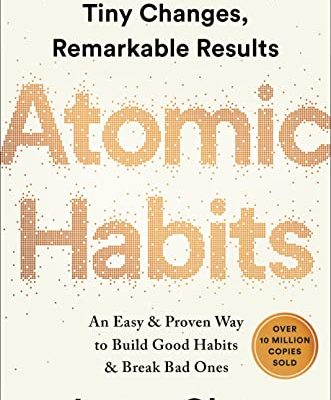 Atomic Habits: Building Good And Breaking Bad HabitsOriginal price was: 25,00 €.13,00 €Current price is: 13,00 €.
Atomic Habits: Building Good And Breaking Bad HabitsOriginal price was: 25,00 €.13,00 €Current price is: 13,00 €. -
 Albert Einstein Quote Poster – In the middle of difficulty lies opportunity13,00 € – 23,00 €
Albert Einstein Quote Poster – In the middle of difficulty lies opportunity13,00 € – 23,00 € -
 Blossom with Confidence and Joy Ceramic Mug – Vibrant Floral Design8,00 €
Blossom with Confidence and Joy Ceramic Mug – Vibrant Floral Design8,00 €
#4 – Develop Resilience
Being resilient doesn’t mean you won’t face difficulties; it means you’ll recover more quickly when you do. Resilience is like a muscle; the more you exercise it, the stronger it becomes. Life might knock you down, but resilience helps you get back up, dust yourself off, and keep going. And, according to Horace, adversity reveals genius!
Quick Tip: Celebrate small victories and learn from setbacks. Both are essential steps to building resilience.
#4 Of 5 Skills – Maintain A Positive Attitude
A positive attitude can be your best friend during times of change. When you’re optimistic, you’re more open to new experiences and more willing to tackle challenges head-on. A positive outlook often leads to positive outcomes.
On the other hand, being downbeat or pessimistic can weigh you down when you’re navigating through change and difficulties. Adopting this mindset tends to close off opportunities and make challenges seem insurmountable.
Instead of seeing change as a chance to grow, a pessimistic outlook might make you feel stuck as if you’re carrying a heavy backpack that gets heavier with each step.
But the good news? Mindsets can change. Remember that you can shift your perspective and lighten that backpack even if you find yourself leaning towards pessimism.
Quick Tip: Surround yourself with uplifting people and content. Your environment plays a significant role in shaping your mindset.
Final Thoughts To Power You Forward
There you have it—5 skills for navigating change and uncertainty like a pro! Life is a beautiful, messy mix of ups and downs, but armed with these skills, you’re ready to make the most of it. So go on, embrace the changes coming your way. You’ve got this!
Remember, life doesn’t get easier; you get better at living it. Stay awesome! 🌟
-

What Is Self Sabotaging Meaning?
Hello, friends! Today, we’re exploring “What is Self Sabotaging Meaning.” This is a touchy subject that many of us are way too familiar with and struggle to overcome.
Imagine you’ve set a New Year’s resolution to eat healthier, but come February, you find yourself snacking on chips and cookies instead of fruits and vegetables. What is self-sabotaging meaning, you ask? You just read an example! But why do we do it, and most importantly, how can we stop? Let’s break it down and find our path to success together!
What Is Self-Sabotaging?
In simple terms, self-sabotaging is when your actions directly stand in the way of achieving your goals or mess up your plans. For example, it’s like setting a goal to exercise more on your days off but then spending your weekend binge-watching TV shows and mindlessly munching on snack foods.
Instead of taking steps to achieve your goals, you’re standing in the way of yourself, stopping yourself from reaching what you want.

Why Do People Self-Sabotage?
Before we tackle how to stop self-sabotage, let’s understand why we do it in the first place. Is it just bad luck, or is there something deeper going on? Get ready to unravel some common reasons behind this tricky habit!
- Fear: Sometimes, we’re scared of success or failure. So, we ruin things on purpose. It’s less scary that way.
- Comfort Zone: We are used to certain things, even if they’re not good for us. Making a change feels tough, so we mess things up to stay where we are.
- Low Self-Esteem: When you don’t feel good about yourself, you might think you don’t deserve good things. So, you stop yourself from achieving them.
- Bad Habits: Sometimes, we’re just used to doing things a certain way, even if it’s not helping us. It’s like biting your nails when you’re nervous.
How To Stop Self-Sabotaging Yourself
Now that we’ve discussed the different reasons people self-sabotage, let’s talk about actionable steps you can take to stop the cycle.
- Recognize the Signs: The first step is knowing you’re doing it. Be honest with yourself. That’s the first step to healing.
- Talk to Someone: Sometimes, it helps to look beyond yourself to get another perspective. Consider talking with a supportive friend or family member to see things differently. If possible, avoid involving someone who is judgemental or closed-minded.
- Set Small Goals: Embracing significant changes can feel overwhelming. Instead, start with small, doable steps. If you want to be healthier, start by walking 10 minutes a day. Then, make the time to get it done.
- Celebrate Wins: Whenever you reach a small goal, pat yourself on the back. It helps build confidence and keeps you motivated.
- Forgive Yourself: We all mess up sometimes. It’s okay. What’s important is to learn, forgive yourself, and move on.
-
Product on sale
 Atomic Habits: Building Good And Breaking Bad HabitsOriginal price was: 25,00 €.13,00 €Current price is: 13,00 €.
Atomic Habits: Building Good And Breaking Bad HabitsOriginal price was: 25,00 €.13,00 €Current price is: 13,00 €. -
Product on sale
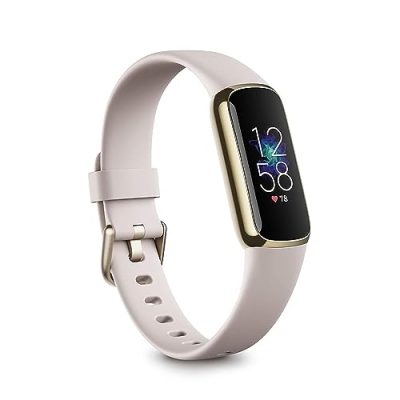 Fitbit Luxe Tracker: Stress, Sleep & 24/7 Heart Rate – Lunar White/Gold Steel 1 CountOriginal price was: 120,00 €.119,00 €Current price is: 119,00 €.
Fitbit Luxe Tracker: Stress, Sleep & 24/7 Heart Rate – Lunar White/Gold Steel 1 CountOriginal price was: 120,00 €.119,00 €Current price is: 119,00 €. -
 Do What Makes Your Soul Shine – Inspirational Hologram Stickers7,00 € – 9,00 €
Do What Makes Your Soul Shine – Inspirational Hologram Stickers7,00 € – 9,00 €
Get In The Game With A Strategy
Great, now that we know what self-sabotage is and how we can stop doing it, next, you need a strategy.
Luckily, there are straightforward and practical ways to get back on track. First up, keep a journal. Whether it’s an old-school notebook or a digital app, jotting down your thoughts can be a game-changer. Write about your goals, your setbacks, and those moments when you caught yourself in the act of self-sabotage. Seeing it all in black and white can offer surprising insights!
Next, make yourself more accountable. Share your goals with someone you trust. When someone who cares about you knows what you’re aiming for, it’s harder to back out. You could schedule regular check-ins with a buddy to discuss your progress. Sometimes, just knowing you’ll have to ‘report back’ can give you that extra nudge to stay on course.
But that isn’t all! Consider setting up reminder notifications on your phone or computer. A simple message like “You got this!” or “Keep going!” popping up in the middle of your day can work wonders.
Lastly, take into account the power of positive reinforcement. Treat yourself when you hit small milestones. A little reward can go a long way in keeping you motivated.
Remember, You Got This!
Remember, as it relates to self sabotaging meaning, the only person who can truly stop you is you. You’re more powerful than any obstacle in your way. So, let’s get out there, shake off self-sabotage, and live our best lives!
Keep shining, keep dreaming, and keep moving forward. You’ve got this!
Feel free to share your thoughts and personal stories below. Let’s create a positive and uplifting community together.
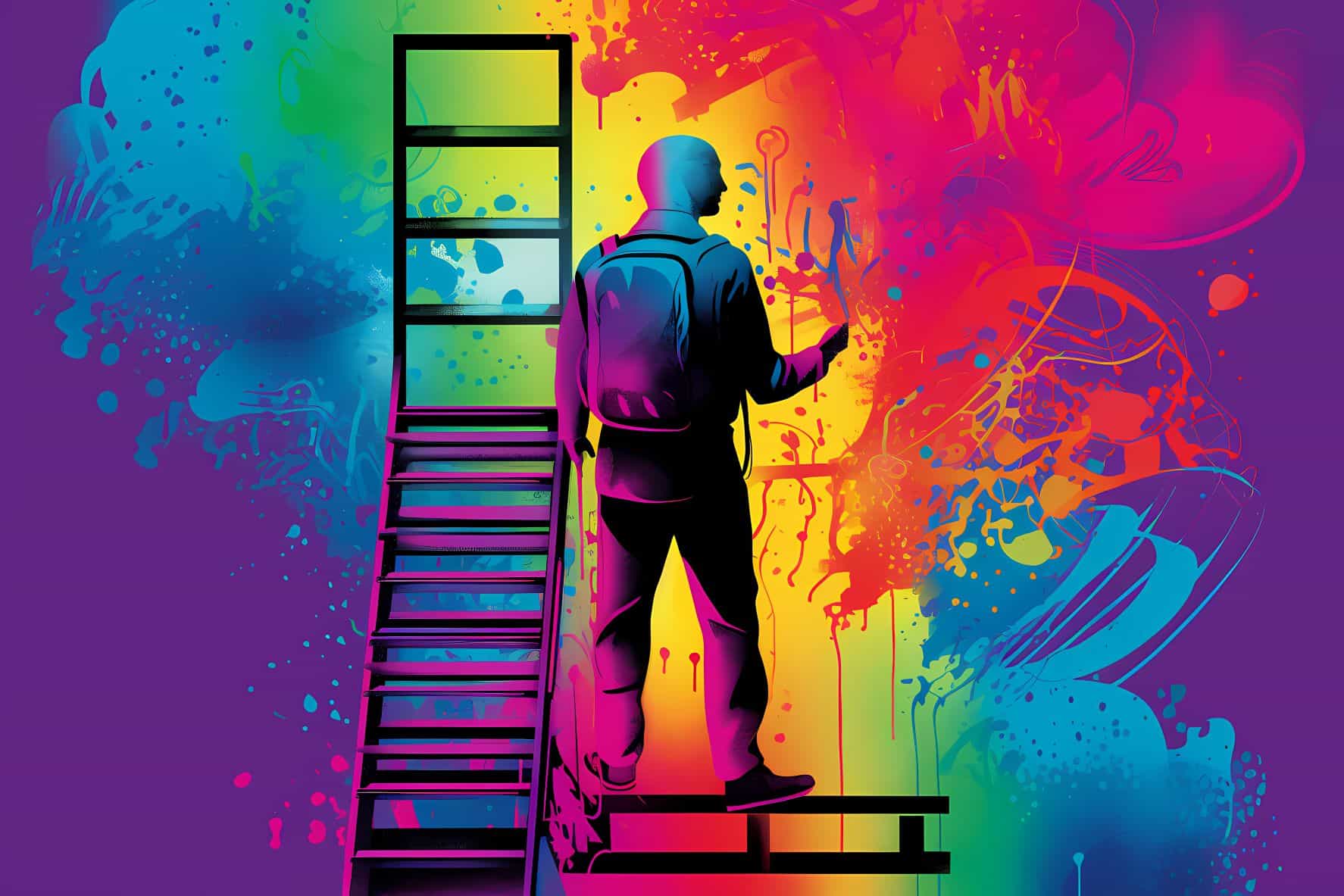
Unleash Your Potential: The Power of Personal Branding 💥
Hello, go-getters! 🌟 Today, we’re diving into a topic that can transform your life: Personal Branding. Yep, you heard that right! Forming a brand is not just for celebrities or big-shot CEOs; it’s for you, me, and anyone eager to shine in their personal and professional life. So, let’s unveil the magic of personal branding and how it’s your ticket to personal growth, business success, and career advancement! 🚀
Why Personal Branding? 🤔
Have you ever wondered how some people seem to have everything together? They’re not just good at what they do; others adore them for being who they are! That, my friends, is the magic of a well-crafted personal brand.
Personal Growth 🌱
Crafting your personal brand forces you to dig deep. You examine your core values, beliefs, and vision for your life. This self-awareness journey often results in unexpected personal growth. You’re not just building a brand but a better you!
Business Success 📈
Customers and clients are likelier to engage with a brand when they feel a personal connection. Being your authentic self can boost your business. It’s not just what you sell; it’s who you are that makes the difference. 🌟

Career Advancement 🎓
Want to be the first name that comes to mind when new opportunities surface at work? A solid personal brand makes you unforgettable. It’s like wearing an invisible badge that says, “I’m the go-to person for this.”
The Basics: Crafting Your Personal Brand 🛠️
Enough talk! Here are some simple steps to kickstart your personal branding journey:
Step 1: Know Thyself 🤗
Sit down with a notepad and jot down your strengths, weaknesses, and unique qualities. This self-analysis is the cornerstone of your brand.
Step 2: Define Your Audience 👥
Who are you trying to connect with? Whether it’s potential employers, clients, or industry leaders, having a target audience helps you tailor your message effectively.
Step 3: Create a Personal Statement 📝
Your statement is your elevator pitch—the core message you want to convey. Make it catchy, make it all about you!
Step 4: Be Consistent 🔄
Consistency is vital, whether it’s social media, your blog, or your wardrobe. Consistently sharing makes you easily recognizable and helps build trust.
Step 5: Engage and Update 👏
Personal branding is not a “set it and forget it” thing. Keep engaging with your audience and update your brand as you evolve.
Let’s Wrap It Up! 🎁
So, you see, personal branding isn’t just a buzzword—it’s your secret sauce for success and fulfillment. Ready to become the best version of yourself and achieve things you never thought possible? Begin building your personal brand today and watch how doors of opportunity swing open in every aspect of your life! 🚪🔑
Ready, Set, Brand! 🌈
Your journey to personal and professional greatness is just a brand away. Are you ready to embrace it? 🌟 Let’s do this, and remember, the world needs the incredible brand that is YOU! 💖
Happy Branding! 🎉

Self-Forgiveness: Healing From Within
Self-forgiveness. Life can be a complicated journey, filled with ups and downs. Mistakes are a natural part of life, but they don’t have to define who you are.
Let’s explore a magical pathway to healing and moving forward despite our faults: self-forgiveness. Many people are their own worst critics. Forgiving yourself is about being gentle and kind to yourself, accepting your flaws, and moving forward with joy and grace. Let’s dig into how self-forgiveness is among the first steps to healing from within.
Understanding Self-Forgiveness
Self-forgiveness is not about forgetting what you’ve done or simply brushing things under the rug. It’s about acknowledging the mistake, learning from it, and moving forward. Think of it as a warm embrace for your soul. It’s a way to say, “I messed up, but that’s okay. I’m still a good person and can grow from this.”

Be Kind To Yourself
Before you can be kind and forgiving to others, you have to start with yourself. Think of it as putting on your oxygen mask before helping others on an airplane. Treat yourself with the same compassion you would offer a dear friend. Gently speak to yourself, and recognize that everyone makes mistakes. Remember, knowing this is not enough – we must apply the approach in everyday life.
Steps To Self-Forgiveness
Forgiving oneself is a journey that takes time and effort but is a path filled with growth and enlightenment. Self-forgiveness involves understanding and accepting what has happened without letting it weigh down your heart, whether a small blunder or a significant mistake.
Recognize that you are human and that mistakes are opportunities to learn and grow. Embarking on this journey can be a powerful experience that leads to healing and a more contented life.
Below, we’ve outlined some essential steps to self-forgiveness that are easy to follow and can make this journey more meaningful for you. Let’s explore these steps together, taking one stride at a time towards a more forgiving and compassionate you!
- Acceptance: Understand that what happened has happened. It’s a part of your history but doesn’t dictate your future.
- Responsibility: Acknowledge your role in the situation without harsh judgment.
- Learning: Discover what the situation can teach you and how you can grow.
- Moving Forward: Focus on the present and the positive steps you can take now.
The Ripple Effect Of Self-Forgiveness
By forgiving yourself, you open yourself to seeing others in a more understanding light. That compassion spreads like ripples in a pond. As you grow kinder to yourself, you naturally become more forgiving of others.
Empowering Your Future
Life is about moving forward. And self-forgiveness is an empowering tool for building a happier, healthier future. By releasing the burden and pain of past mistakes, you make room for joy, creativity, and love. You empower yourself to live a life full of potential.
Self-Forgiveness Is The Path Forward
Self-forgiveness is a path that leads to healing from within. It’s about recognizing human nature, embracing imperfections, and moving forward confidently and kindly. Let’s all take a moment to be gentler with ourselves today, for in forgiving ourselves, we find the strength and wisdom to forgive others.
Remember, friend, the journey to self-forgiveness starts with a single step: be kind to yourself. That’s where the magic begins! 🌟
-
 Limitless Thinker’s Ultra Cotton Long Sleeve Tee – Classic Fit, Comfortable T-Shirt17,00 € – 24,00 €
Limitless Thinker’s Ultra Cotton Long Sleeve Tee – Classic Fit, Comfortable T-Shirt17,00 € – 24,00 € -
 Science Saying T-Shirt – Show Your Love for Science with a Clever Saying19,00 € – 32,00 €
Science Saying T-Shirt – Show Your Love for Science with a Clever Saying19,00 € – 32,00 € -
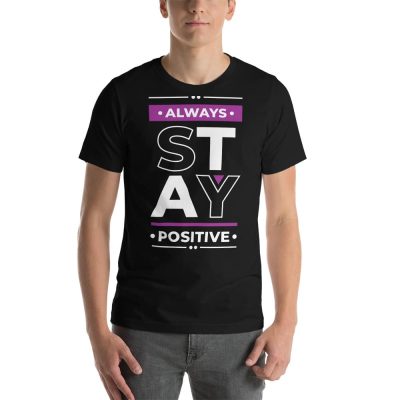 Always Stay Positive T-Shirt15,00 € – 23,00 €
Always Stay Positive T-Shirt15,00 € – 23,00 €

Conscious Consumption: A Mindful Guide To Nourish Your Life
Conscious consumption. Undoubtedly, life’s a feast! And just like any feast, what we feed our minds, body, and spirit matters, whether it’s food, information, or ideas. Embracing mindful choices makes life more prosperous, enjoyable, and nourishing. Let’s dive into how we can do just that!
🍎 Conscious Consumption – Feeding The Body Right
As it applies to nourishing ourselves, the foods we choose go beyond fueling our bodies. They are a vibrant expression of our lifestyles and values.
Embracing a mindful approach to what we eat opens up a world of flavors, textures, and nutrients that can ignite our taste buds and energize our bodies. But more importantly, it’s about forming a joyful connection with what’s on our plate.
Celebrate With Your Plate!
Imagine every meal as an opportunity to celebrate life, to acknowledge the hard work of farmers, chefs, or even our own hands in the kitchen. It’s about recognizing that food is not just something we consume in haste; it’s a delightful experience that can teach us patience, gratitude, and the pure pleasure of savoring the present moment. Consistent effort over time matters even if you aren’t ready to completely overhaul your dietary preferences at once.

With a mindful perspective on our food choices, we’re not just feeding our bodies; we’re nourishing our souls, forging connections with our environment, and taking a delicious step towards a healthier, happier life. So, let’s explore how to feed our bodies right, one tasty bite at a time! Here are some helpful tips to nourish your day:
Hydrate With Awareness: Water is the elixir of life. It makes up more than 50% of our body. And often, what we mistake for hunger is our body’s cry for hydration. Studies have shown that people mistake feelings of hunger when they’re thirsty up to 37%.
By tuning into this subtle signal and reaching for a refreshing glass of water, we nourish our cells, aid digestion, and enhance our overall well-being.
Think of water as a clear, revitalizing river flowing through your body, carrying nutrients, flushing out toxins, and keeping everything in balance. So next time you feel hungry, consider whether a sip of water might be all you need. Embracing the wisdom of water is a simple yet profound step towards a more mindful and healthful life.
Choose Colorful And Nutritious Ingredients: Brightly colored fruits, vegetables, and whole grains are delicious and packed with energy and goodness. Open up your palette and explore new flavors and enjoy every bite!
Listen To Your Body: Your body knows what it needs. Tune in to your hunger, thirst, and fullness cues, and give your body exactly what it craves.
🧠Conscious Consumption To Feed Your Mind
Just as we carefully select the ingredients for a nourishing meal, we must be equally thoughtful about the information and ideas we consume. Our minds are like fertile gardens, and the thoughts we plant shape our perceptions, attitudes, and, ultimately, our lives. But here’s the beautiful part – we can choose what we cultivate!
By mindfully selecting positive, enlightening, and empowering content, we can grow a garden of wisdom, creativity, and joy within ourselves. It’s not just about avoiding the negative; it’s about actively seeking the good stuff that resonates with our hearts and sparks our curiosity. Ready to embark on an intellectual adventure? Let’s explore ways to feed our minds right, turning every day into a thrilling journey of discovery, growth, and fulfillment. Here are a few tips for cultivating a healthy mind space:
Apply Critical Thinking To Decipher Reality:
In a world flooded with information, not all sources are created equal. Some may inspire, while others may mislead or even harm. That’s where you must rely on conscious consumption and critical thinking. Critical thinking empowers us to question, analyze, and evaluate the information we encounter, helping us distinguish between truth and illusion.
Critical thinking is not about doubting everything; it’s about engaging with content thoughtfully and making wise decisions that align with our values and beliefs. By honing this skill, we become our best advocates, navigating the vast ocean of information with confidence and discernment.
It’s like having a mental filter that lets the nourishing insights flow while keeping the harmful ones at bay. Embrace critical thinking, and turn it into a daily practice. It enriches both your mind and your life, leading you toward clarity, wisdom, and authentic growth. Here are some tips:
Seek Quality Information: Find sources that enrich your life and make you think. Subscribe to positive channels, read inspiring books, and engage with uplifting communities.
Reflect On What You Learn: Take a moment to think about what you’ve read or heard. What resonates with you? How can you apply it in your daily life?
🌍 Feeding The Soul Right
Our soul, that profound and essential part of ourselves, also hungers for nourishment. It seeks connection, purpose, and harmony with the universe. But how do we feed something so intangible and profound? The answer lies in the choices we make, the values we uphold, and the love we share. Nurturing our souls is an art, a delicate balance of listening to our inner voices and acting with intention.
It’s about finding joy in simple acts of kindness, appreciating the beauty around us, and engaging with life in a way that resonates with our deepest selves. When we feed our souls right, we light a spark within that radiates outward, illuminating our paths and touching the lives of others. Ready to embark on this soulful journey? Let’s explore how we can nourish our inner beings and enrich our lives from the inside out.
Spread Kindness and Compassion: Extend kindness, compassion, and understanding when interacting with others. Share love, empathy, and understanding as you would share a meal with a friend.
Embrace Positive Growth: Set realistic goals that align with your values. Celebrate your progress and keep moving forward.
✨ Forge Your Future With Conscious Consumption
Life is a journey, and being mindful of everything we consume helps us navigate life with grace, wisdom, and joy. Whether savoring a home-cooked meal or absorbing a life-changing book, being conscious of our choices makes a difference.
Today, reflect on your consumption habits. Remember, every small change is a move to a more mindful life. You’ve got this!
-
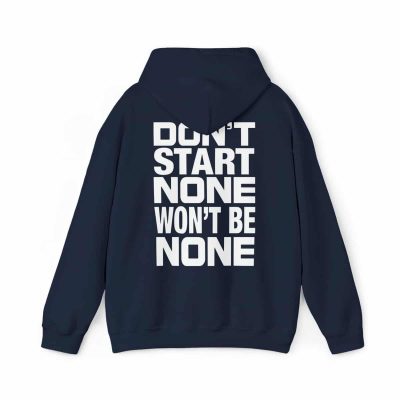 Funny Retro Saying Hoodie – Cozy and Stylish Sweatshirt for Cold Days29,00 € – 34,00 €
Funny Retro Saying Hoodie – Cozy and Stylish Sweatshirt for Cold Days29,00 € – 34,00 € -
 Funny Bigfoot Pun Tee – Soft and Comfortable Unisex T-Shirt31,00 € – 37,00 €
Funny Bigfoot Pun Tee – Soft and Comfortable Unisex T-Shirt31,00 € – 37,00 € -
 Science Saying T-Shirt – Show Your Love for Science with a Clever Saying19,00 € – 32,00 €
Science Saying T-Shirt – Show Your Love for Science with a Clever Saying19,00 € – 32,00 €
-

Understanding Quiet People: What To Know
Quiet people. They are rare in the bustling world filled with noise and chatter. But sometimes, you encounter quieter people who keep their thoughts to themselves. From the outside looking in, they seem aloof, shy, or disinterested. But it’s essential to avoid making a fast judgment about those who appear not to have much to say.
Instead of making rash judgments, let’s take a moment to understand the beauty and complexity of those on the quieter side.
Quiet People: Silence Doesn’t Mean Disinterest
People who are less talkative may appear uninterested, but often that’s far from the truth. They might be deeply thoughtful, observant, and engaged in the conversation differently. For instance, instead of immediately speaking, they absorb information, analyze it quietly, and carefully choose their words when speaking.
This mindful approach to communication doesn’t reflect disengagement but rather a profound connection with the subject. When quieter people share insights, they inject thoughtful and unique perspectives that can bring a fresh and meaningful dimension to a topic or conversation.
Understanding this different approach to communication can lead to other ideas, strategies, or objections. Being a person who appreciates their perspective creates a stronger connection.

They Value Deep Connections
Quieter people often cherish deep and meaningful connections. They may not enjoy small talk or gossip, but when they find something that interests them, they can engage in profound and inspiring conversations that reveal a whole new side of them.
Respect Their Comfort Zone
Some people thrive in the limelight, while others shine on the sidelines. This preference isn’t something to change but to embrace. You’ll find a more authentic and enriching connection by respecting their comfort zone and allowing them to express themselves at their pace.
Quiet People Have Unique Strengths
Quiet people often have unique and incredible strengths. They may be shy or introverted. Shy or introverted people often feel more comfortable listening than talking, so they may talk less for several reasons.
Quiet people often have a lot to say, but they may choose to be selective about the words and topics they speak. Before they say something, they want to ensure their comments are meaningful and well-thought-out.
Additionally, many people who talk less are observant and pay attention to the details of their surroundings. For example, they may be good at reading people and situations and prefer to let their actions speak louder than their words.
As a quiet type, they may be comfortable with silence. People who don’t talk a lot may not feel the need to fill every silence with noise or words. They may be content to enjoy the company of others without talking constantly.
Unfortunately, others may misunderstand quiet people. They may assume they are shy, unfriendly, or disengaged. But this is only sometimes true. People who don’t talk a lot communicate differently and protect themselves from judgemental people who aren’t interested in their perspective.
Often, they are great listeners, deep thinkers, and highly empathetic. These qualities make them exceptional friends, partners, and colleagues who can provide unique perspectives and insights.
They Have Concentrated Interests
Quiet individuals often possess interests and hobbies that require deep concentration and mindfulness and lie outside the mainstream.
Whether delving into intricate art forms, exploring complex scientific theories, or engaging in thoughtful reading and writing, these pursuits allow them to channel their reflective nature into something beautiful and profound.
These non-mainstream interests are not just hobbies but a manifestation of their personality, reflecting a curiosity and passion for exploring areas that might be less traveled.
By understanding and appreciating these unique interests, we can connect with them on a deeper level and learn to see the world through a different and equally captivating lens.
Their commitment to these thoughtful pursuits reminds them that there’s beauty and significance in exploring and immersing oneself in something, even if there are more popular or well-known paths.
Embrace The Mystery of Quiet People
There’s a particular mystery to those who don’t breathe words to every thought or reveal everything about themselves in a long run-on sentence. It invites curiosity and a chance to explore layers of personality that are not immediately apparent. Remember, the most exciting book often has unexpected twists and turns.
Tips For Communication
If you’re looking to connect with someone who’s less talkative, here are a few tips:
Be Patient – It may take some time for people who are on the quiet side to open up to you. Don’t pressure them to talk if they are uncomfortable.
Be A Good Listener – When quiet people open up to you, listen attentively and ask questions. Doing so demonstrates that you care about what they have to say.
Be Respectful Of Their Boundaries – If someone doesn’t want to talk about something, don’t push them. Respect their right to privacy.
In a world where loud voices often take center stage, quiet individuals are a testament to the power of subtlety and grace. They usually don’t demand attention or scream at the top of their lungs.
Instead, they navigate social landscapes with serene confidence, content in their ability to observe, reflect, and understand without needing to be in the spotlight.
This lack of demand for constant attention doesn’t mean they have nothing to say or offer; in fact, it often signifies a strong sense of self and an appreciation for the thoughts and feelings of others.
Their ability to be present without dominating a conversation or environment can create a calming and inclusive atmosphere where everyone feels valued and heard. Recognizing and appreciating this quality can lead to rewarding, more balanced personal and professional interactions.
-
 Shop the Star Proton T-Shirt – Unisex Jersey Long Sleeve Tee20,00 € – 25,00 €
Shop the Star Proton T-Shirt – Unisex Jersey Long Sleeve Tee20,00 € – 25,00 € -
 Science Saying T-Shirt – Show Your Love for Science with a Clever Saying19,00 € – 32,00 €
Science Saying T-Shirt – Show Your Love for Science with a Clever Saying19,00 € – 32,00 € -
 Shop Positive Saying Organic Creator Unisex T-Shirt – Eco-Friendly and Comfy30,00 € – 33,00 €
Shop Positive Saying Organic Creator Unisex T-Shirt – Eco-Friendly and Comfy30,00 € – 33,00 €
Updated 1/25/2024
-

The Importance of Building Relationship Skills
Relationship skills are not just about building connections; they are an essential part of our daily lives, influencing personal and professional spheres. In our personal lives, strong relationship skills foster deeper connections with friends and family, leading to a support system vital for mental well-being.
Professionally, these skills enable collaboration, trust, and a positive working environment, contributing to career success. The beauty of relationship skills lies in their universality; whether you are a parent, partner, friend, or colleague, these skills significantly impact how you interact and bond with others.
Aims of the Building Relationships Skills Guide
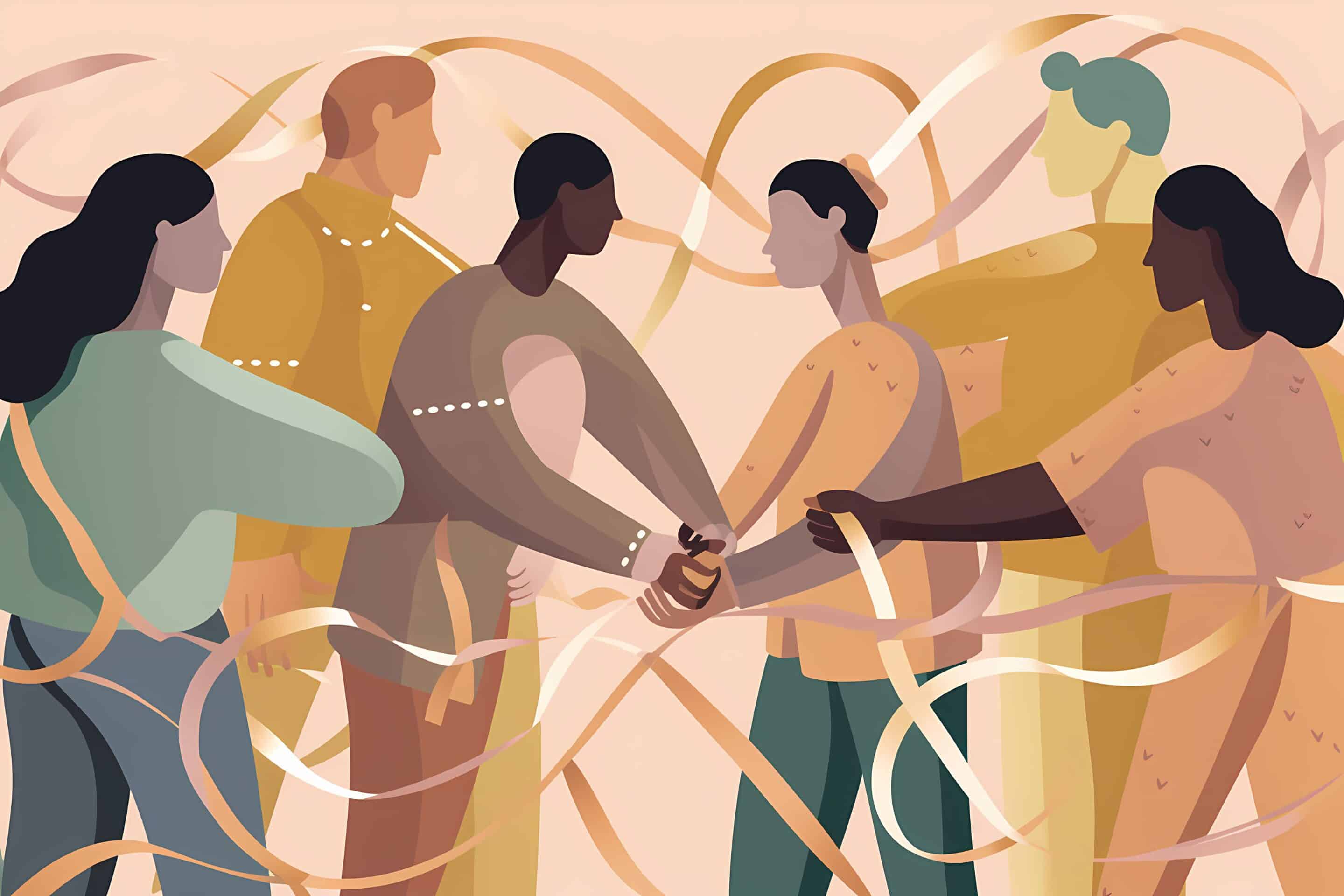
We’ve created a comprehensive guide to understanding and improving relationship skills. By the end of the post, readers will have a clear understanding of what constitutes relationship skills, why they are essential, and practical ways to enhance them in various life contexts.
Whether you’re looking to strengthen a romantic relationship, develop better connections with colleagues, or become more empathetic and compassionate in your interactions, this article is a starting point that caters to everyone. Join us in exploring these vital skills that can enrich your life and the lives of those around you.
Part I: Understanding Relationship Skills
Defining Relationship Skills
Relationship skills encompass various abilities that allow us to interact positively with others. These skills enable us to establish, maintain, and enhance connections with individuals in different areas of our lives. Here are some key components:
- Communication: Effective communication sets the cornerstone for any successful relationship. Speaking freely includes expressing thoughts and feelings clearly and listening actively to understand others.
- Empathy: Understanding and sharing another person’s feelings and ” putting yourself in their shoes” is essential in building strong connections.
- Trust: Trust is about believing in the reliability and truth of others. The foundation holds relationships together and grows over time with consistency and honesty.
- Respect: Valuing others’ thoughts, feelings, and opinions, even if they differ from our own, fosters a sense of equality and understanding.
- Conflict Resolution: Managing conflicts constructively without letting them deteriorate the relationship is vital for long-term success.
These components are intertwined to form the basis of healthy and thriving relationships.
Why Relationship Skills Matter
Relationship skills are more than just social niceties; they have profound implications for our mental health, happiness, and overall success.
- Mental Health: Strong relationships provide support, reduce stress, and contribute to a sense of belonging and self-worth. They can be a buffer against mental health issues like anxiety and depression.
- Happiness: Healthy relationships increase satisfaction by fulfilling our fundamental human need for connection. They can lead to more enjoyable experiences and a more positive outlook on life.
- Success: In a personal or professional context, relationship skills enable collaboration, teamwork, and mutual growth. They lead to a more productive and harmonious environment in the workplace, contributing to career advancement.
- Wider Societal Impact: On a broader level, cultivating relationship skills leads to a more compassionate and understanding society. It encourages tolerance, cooperation, and community building.
Building Relationship Skills Starts with Understanding Their Crucial Nature
Understanding relationship skills is not just about knowing what they are but recognizing their profound impact on our lives. From personal well-being to professional success, these skills play a lasting role in increasing the quality of our interactions and connections. As we delve deeper into this subject, we will explore how to develop and apply these skills in various aspects of life.
This section sets the foundational understanding of relationship skills, paving the way for the reader to explore more specific aspects in subsequent parts of the blog post. Let me know if you’d like further details or any adjustments!
The Importance of Building Relationship Skills
Relationship skills are not just about building connections; they are an essential part of our daily lives, influencing personal and professional spheres. In our personal lives, strong relationship skills foster deeper connections with friends and family, leading to a support system vital for mental well-being.
Professionally, these skills enable collaboration, trust, and a positive working environment, contributing to career success. The beauty of relationship skills lies in their universality; whether you are a parent, partner, friend, or colleague, these skills significantly impact how you interact and bond with others.
Aims of the Building Relationships Skills Guide
We’ve created a comprehensive guide to understanding and improving relationship skills. By the end of the post, readers will have a clear understanding of what constitutes relationship skills, why they are essential, and practical ways to enhance them in various life contexts.
Whether you’re looking to strengthen a romantic relationship, develop better connections with colleagues, or become more empathetic and compassionate in your interactions, this article is a starting point that caters to everyone. Join us in exploring these vital skills that can enrich your life and the lives of those around you.
Part I: Understanding Relationship Skills
Defining Relationship Skills
Relationship skills encompass various abilities that allow us to interact positively with others. These skills enable us to establish, maintain, and enhance connections with individuals in different areas of our lives. Here are some key components:
- Communication: Effective communication sets the cornerstone for any successful relationship. Speaking freely includes expressing thoughts and feelings clearly and listening actively to understand others.
- Empathy: Understanding and sharing another person’s feelings and ” putting yourself in their shoes” is essential in building strong connections.
- Trust: Trust is about believing in the reliability and truth of others. The foundation holds relationships together and grows over time with consistency and honesty.
- Respect: Valuing others’ thoughts, feelings, and opinions, even if they differ from our own, fosters a sense of equality and understanding.
- Conflict Resolution: Managing conflicts constructively without letting them deteriorate the relationship is vital for long-term success.
These components are intertwined to form the basis of healthy and thriving relationships.
Why Relationship Skills Matter
Relationship skills are more than just social niceties; they have profound implications for our mental health, happiness, and overall success.
- Mental Health: Strong relationships provide support, reduce stress, and contribute to a sense of belonging and self-worth. They can be a buffer against mental health issues like anxiety and depression.
- Happiness: Healthy relationships increase satisfaction by fulfilling our fundamental human need for connection. They can lead to more enjoyable experiences and a more positive outlook on life.
- Success: In a personal or professional context, relationship skills enable collaboration, teamwork, and mutual growth. They lead to a more productive and harmonious environment in the workplace, contributing to career advancement.
- Wider Societal Impact: On a broader level, cultivating relationship skills leads to a more compassionate and understanding society. It encourages tolerance, cooperation, and community building.
Building Relationship Skills Starts with Understanding Their Crucial Nature
Understanding relationship skills is not just about knowing what they are but recognizing their profound impact on our lives. From personal well-being to professional success, these skills play a lasting role in increasing the quality of our interactions and connections. As we delve deeper into this subject, we will explore how to develop and apply these skills in various aspects of life.
This section sets the foundational understanding of relationship skills, paving the way for the reader to explore more specific aspects in subsequent parts of the blog post. Let me know if you’d like further details or any adjustments!
Part II: Essential Relationship Skills
Communication Skills:
Effective Communication is at the heart of all relationships. Here’s how it breaks down:
- Active Listening: It’s more than just hearing words; it’s about understanding the underlying emotions and intentions. Active listening requires full attention, asking follow-up questions, and offering empathy.
- Expressing Yourself Clearly: Clarity in Communication means using simple language, avoiding ambiguity, and ensuring your message is understood.
- Non-verbal Communication includes body language, eye contact, and facial expressions. These subtle cues can communicate feelings even when words fail.
Empathy and Compassion:
These skills help in connecting with others on an emotional level.
- Understanding Others’ Feelings: Taking the time to understand what others are feeling and why helps in forming more profound connections.
- Showing Support: Beyond understanding, offering support through words and actions reinforces bonds and builds trust.
Trust Building:
Building trust is a multifaceted process that includes the following:
- Honesty: Being truthful and transparent, even when difficult, fosters trust.
- Consistency: Regularly following through on promises and commitments is vital to building trust.
- Respect: Honoring others’ opinions, privacy, and individuality shows that you value them, strengthening trust.
Conflict Resolution:
Conflicts are natural, but it’s how you handle them that matters:
- Identifying Problems: The first step is recognizing the problem without blame and understanding its root cause.
- Finding Common Ground: Focusing on shared goals and values can foster collaboration and resolution.
- Constructive Criticism: Offering feedback in a positive, solution-oriented manner helps in resolving conflicts without hurting relationships.
Skills are Building Blocks
The essential relationship skills outlined in this section are the building blocks of healthy and fulfilling connections. Whether it’s the way we talk, understand, trust, or resolve conflicts, these skills can be nurtured and developed with mindfulness and practice. They set the stage for a life enriched with meaningful relationships, both personally and professionally.
Part III: How to Improve Relationship Skills
Self-awareness: Tips for Understanding Your Own Emotions and Responses
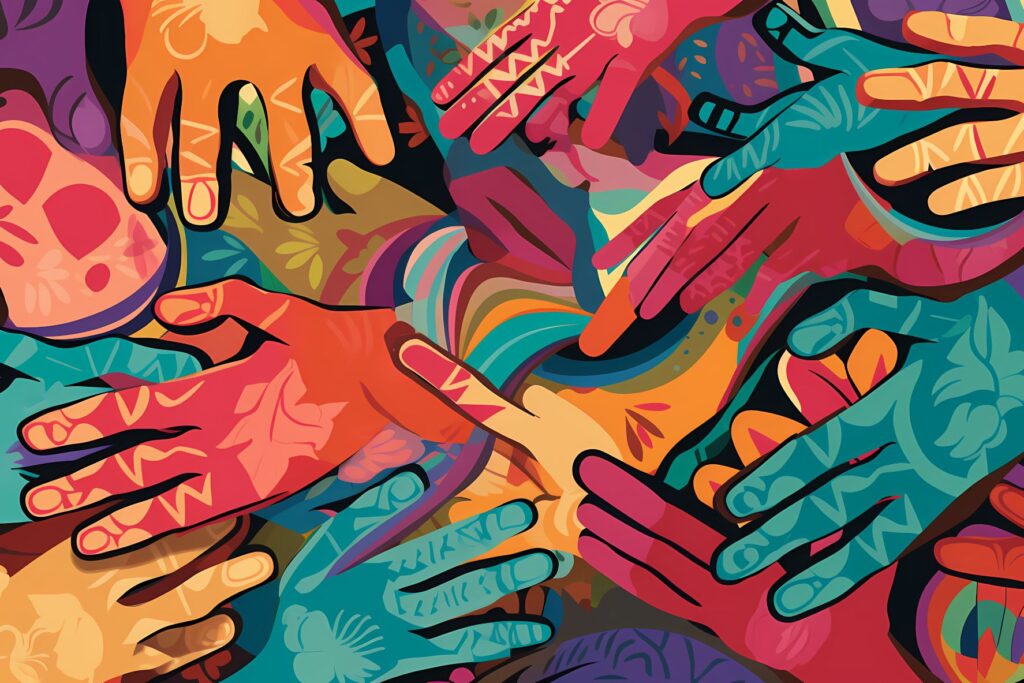
Self-awareness is the key to understanding how your emotions and responses impact your relationships. Here’s how you can enhance your self-awareness:
- Reflect on Your Feelings: Identify what you feel and why. Understand how your emotions influence your reactions.
- Keep a Journal: Writing about your daily interactions and feelings can help you notice patterns and triggers.
- Ask for Feedback: Sometimes, others can provide insights into your behavior that you might not see yourself.
- Mindfulness Practice: Mindfulness techniques can help you stay present and more in tune with your emotions.
Practical Exercises: Guided Activities to Practice and Enhance Relationship Skills
Improving relationship skills requires practice. Here are some exercises to help:
- Active Listening: Practice listening without interrupting and summarizing what you’ve heard.
- Empathy Exercises: Role-playing can help you understand others’ feelings better.
- Trust-building Activities: Engage in activities that require cooperation and reliance on others.
- Conflict Resolution Scenarios: Practicing handling disagreements with respect and understanding.
These activities can be done alone, with a partner, or in a group setting to foster various relationship skills.

Professional Guidance: When and Why, You Might Consider Seeking Professional Help
Sometimes, your situation may require more than personal efforts, and you may need professional guidance. Here’s when and why:
- Complex Issues: If underlying personal or emotional issues affect your relationships, a professional can help you navigate them.
- Struggling to Implement Skills: A coach or therapist can provide personalized strategies if you need help applying these skills in your relationships.
- Preventative Care: Sometimes, seeking professional help when discovering an issue can prevent minor issues from becoming major problems.
Improving Relationship Skills
Improving relationship skills is a journey that requires self-exploration, practice, and sometimes even professional intervention. It’s about being open to growth, recognizing your strengths and weaknesses, and taking proactive steps to enhance your ability to connect with others.
Whether you want to improve a specific area or overhaul your relationship approach, these strategies offer a roadmap to a more fulfilling interpersonal life.
This section provides actionable insights and tools for readers looking to enhance their relationship skills, making it practical and engaging. Let me know if you’d like any additional details or adjustments!

Self-awareness: Tips for Understanding Your Own Emotions and Responses
- Reflect Regularly: Use quiet moments to analyze your emotions and understand what triggers specific reactions.
- Embrace Mindfulness: Techniques like meditation can help you stay attuned to your emotions.
- Seek Feedback: Don’t hesitate to ask close friends or family how they perceive your emotional responses.
Practical Exercises: Guided Activities to Practice and Enhance Relationship Skills
- Communication Drills: Engage in activities that enhance active listening and clear expression.
- Empathy Games: Play games that require understanding and predicting others’ feelings.
- Trust Challenges: Establish trust exercises with friends or colleagues to strengthen this crucial skill.
Professional Guidance: When and Why, You Might Consider Seeking Professional Help
- Persistent Issues: If relationship problems persist, a counselor can provide personalized guidance.
- Skill Development: Professionals offer workshops or sessions to sharpen specific relationship skills.
- Preventive Measures: Regular coaching or therapist sessions can keep your relationship skills sharp and effective.
Part IV: Relationship Skills in Different Contexts

Romantic Relationships: Applying Skills to Foster Intimacy and Connection
- Open Communication: Regular, honest dialogue helps keep romantic connections strong.
- Shared Goals and Values: Finding common ground fosters deeper intimacy.
- Quality Time: Spending quality time together enhances understanding and love.
Friendships: Strengthening Bonds through Understanding and Empathy
- Regular Check-ins: Reach out to friends regularly, showing that you care.
- Be Supportive: Offer support during both good times and bad.
Work Relationships: Enhancing Collaboration and Teamwork
- Positive Communication: Clear and respectful communication fosters a productive work environment.
- Collaboration: Encourage teamwork and collective problem-solving.
Family Relationships: Building Strong Family Connections through Mutual Respect and Care
- Family Time: Regular family gatherings enhance bonds.
- Mutual Respect: Respect for individuality and differences strengthens family connections.
Recap of Key Points
In this article, we’ve navigated the vast landscape of relationship skills. We delved into essential components like communication, empathy, trust building, and conflict resolution, exploring how they can be nurtured and applied in various contexts such as romantic relationships, friendships, work, and family connections. We also provided practical insights on how to hone these skills through self-awareness exercises, guided activities, and professional guidance.
You Can Do It
Now, it’s your turn to take these insights to heart. Embrace the wisdom of active listening, the warmth of empathy, the strength of trust, and the art of resolving conflicts. Make them a daily practice in your interactions. Your relationships are worth the effort, and the rewards of deeper connections and understanding await you.
Additional Resources
Want to explore further? Numerous books, courses, and online tools offer deeper insights and exercises on building relationship skills. Whether you prefer self-study or professional guidance, there’s a world of resources ready to support your journey.
Invite Feedback
We’d love to hear from you! Share your experiences, insights, or questions in the comments below. Have you tried any of these exercises? What worked for you? Your feedback enriches our community and helps others on their relationship-building journey.
Subscribe or Share
Found value in this post? Consider subscribing to our blog for regular updates on topics that matter to you. Or, if you think someone else might benefit from this article, don’t hesitate to share it. Your support helps us reach more people and create positive changes in their lives.
Updated 11/03/2023

Skillful Adventures: Embark on an Exciting Journey to Master New Talents!
Are you ready to embark on a thrilling journey of self-discovery? Skillful Adventures is here to guide you on an exhilarating path toward unlocking your hidden talents and mastering new skills. Whether you aspire to be an artist, musician, or chef, our program offers many exciting opportunities to explore and develop your passions. Get ready to unleash your inner adventurer and dive into a world of endless possibilities!
Unleash Your Inner Adventurer!
Getting caught up in our daily routines and forgetting about the excitement outside our comfort zones is easy in this fast-paced world. Skillful Adventures is about breaking free from the mundane and embracing your inner adventurer. Leave behind the familiar and enter the unknown, where you’ll discover thrilling experiences that will push your boundaries and awaken your senses. It’s time to embark on a journey that will change your life forever!
Discover a World of Skillful Possibilities
Skillful Adventures opens the door to a vast world of possibilities. Whether you’ve always wanted to learn to paint, play an instrument, or cook a gourmet meal, we have an array of exciting classes and workshops tailored to suit your interests. Our team of expert instructors will guide you every step of the way, ensuring that you receive top-notch training and support throughout your skill-building journey. Get ready to unleash your creativity and discover talents you never knew you had!
Embrace the Thrill of Learning Something New
They say learning is a lifelong adventure, and Skillful Adventures fully embraces this belief. Our program encourages individuals of all ages and backgrounds to embrace the thrill of learning something new. From beginners to seasoned enthusiasts, we offer a range of classes that cater to different skill levels. So, whether starting from scratch or looking to refine your talents, we have the perfect adventure waiting for you!

Embrace the Thrill of Learning Something New
Dive into the Exciting Realm of Talent Mastery
Once you’ve dipped your toes into the vast ocean of skillful possibilities, it’s time to dive deeper into the exciting realm of talent mastery. Through our progressive learning approach, you can build upon your foundation and elevate your skills to new heights. Imagine the satisfaction of mastering complex techniques, witnessing your progress, and surprising yourself with your abilities. Skillful Adventures guides you every step of the way as you transform from a novice into a true expert in your chosen field.
Join the Journey to Unlock Hidden Skills
Within each of us lies a treasure trove of hidden skills waiting to be discovered. Skillful Adventures is the key that unlocks this hidden potential and allows you to tap into talents you never knew existed. With our carefully curated curriculum and supportive community, you’ll be amazed at the skills you can uncover. Join us on this journey of self-discovery, and watch as your newfound abilities blossom and enrich your life in unimaginable ways.
Ignite Your Passion with Skillful Adventures
Passion is the fuel that drives us to attain greatness. Skillful Adventures is here to ignite that passion within you. We believe everyone deserves the opportunity to pursue their dreams and indulge in their passions. Our program provides a nurturing environment to explore your interests, connect with like-minded individuals, and fuel your creativity. With Skillful Adventures, you’ll never have to wonder what could have been. Instead, you’ll be too busy living your dreams and embracing the joy of skillful adventures!
Embarking on a journey to master new talents is incredibly fulfilling and exciting. Skillful Adventures allows you to unleash your inner adventurer. Then, you’ll discover a world of skillful possibilities and embrace the thrill of learning something new. Dive into the exciting realm of talent mastery and join us to unlock hidden skills. Ignite your passion and step out of your comfort zone. Let Skillful Adventures guide you toward a life of endless creativity and fulfillment.
Updated 11/02/2023
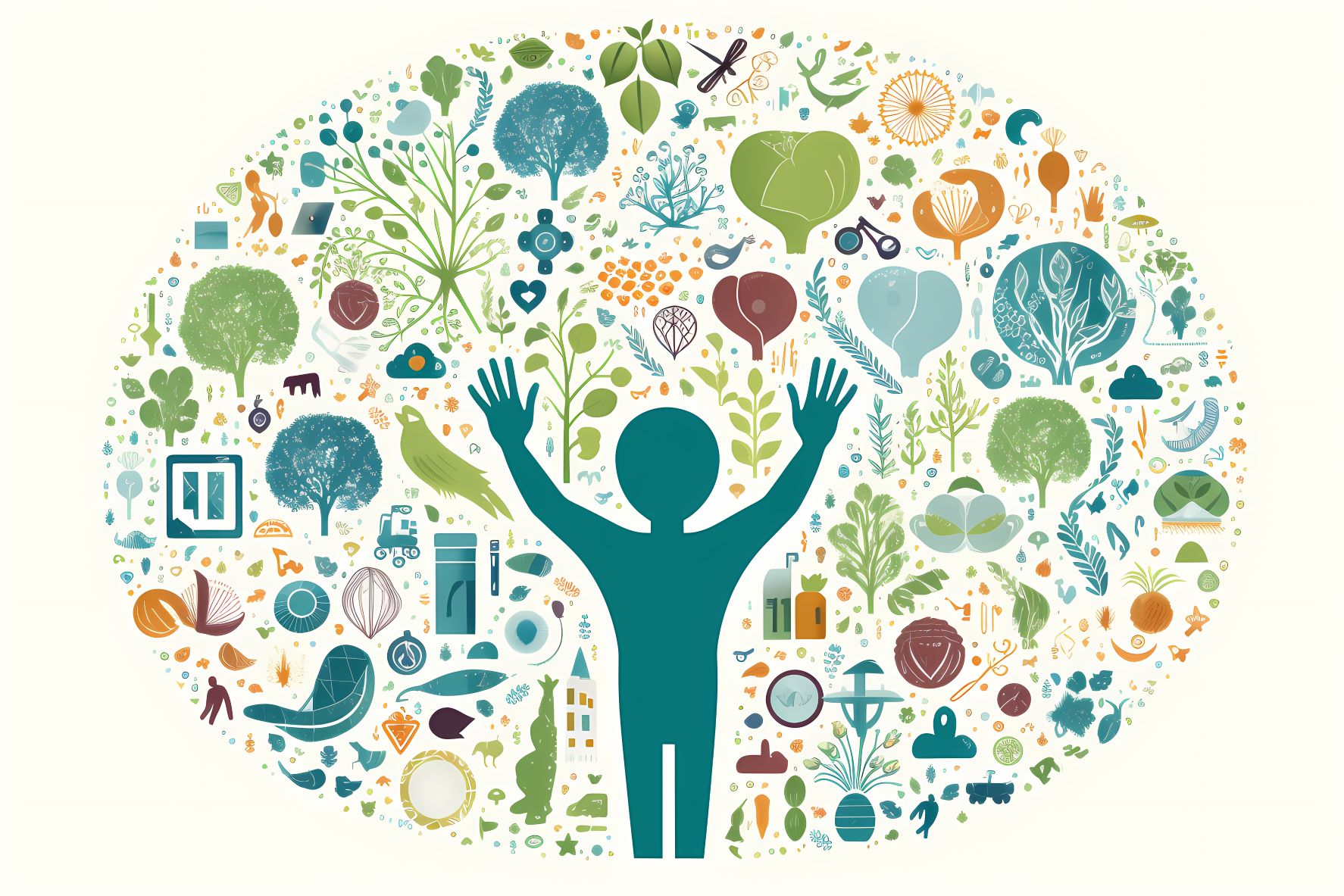
The Power of Holistic Self-Improvement for Personal, Career, and Business
What is Holistic Self-Improvement?
Holistic self-improvement is an all-encompassing approach to personal development that considers the whole person – mind, body, and spirit – in pursuing tremendous personal and professional success. It recognizes that these areas of our lives are interconnected and that progress in one area can often facilitate improvements in another.
Rather than focusing narrowly on one aspect of our lives (like dieting for physical health or practicing mindfulness for mental well-being), holistic self-improvement aims to bring about a state of overall harmony and balance. This approach encourages us to work on various facets of our lives, such as physical health, mental health, emotional well-being, social relationships, spiritual growth, and professional development, all with the understanding that each component contributes to a broader, healthier, and more successful life.
How Does Holistic Self-Improvement Help?
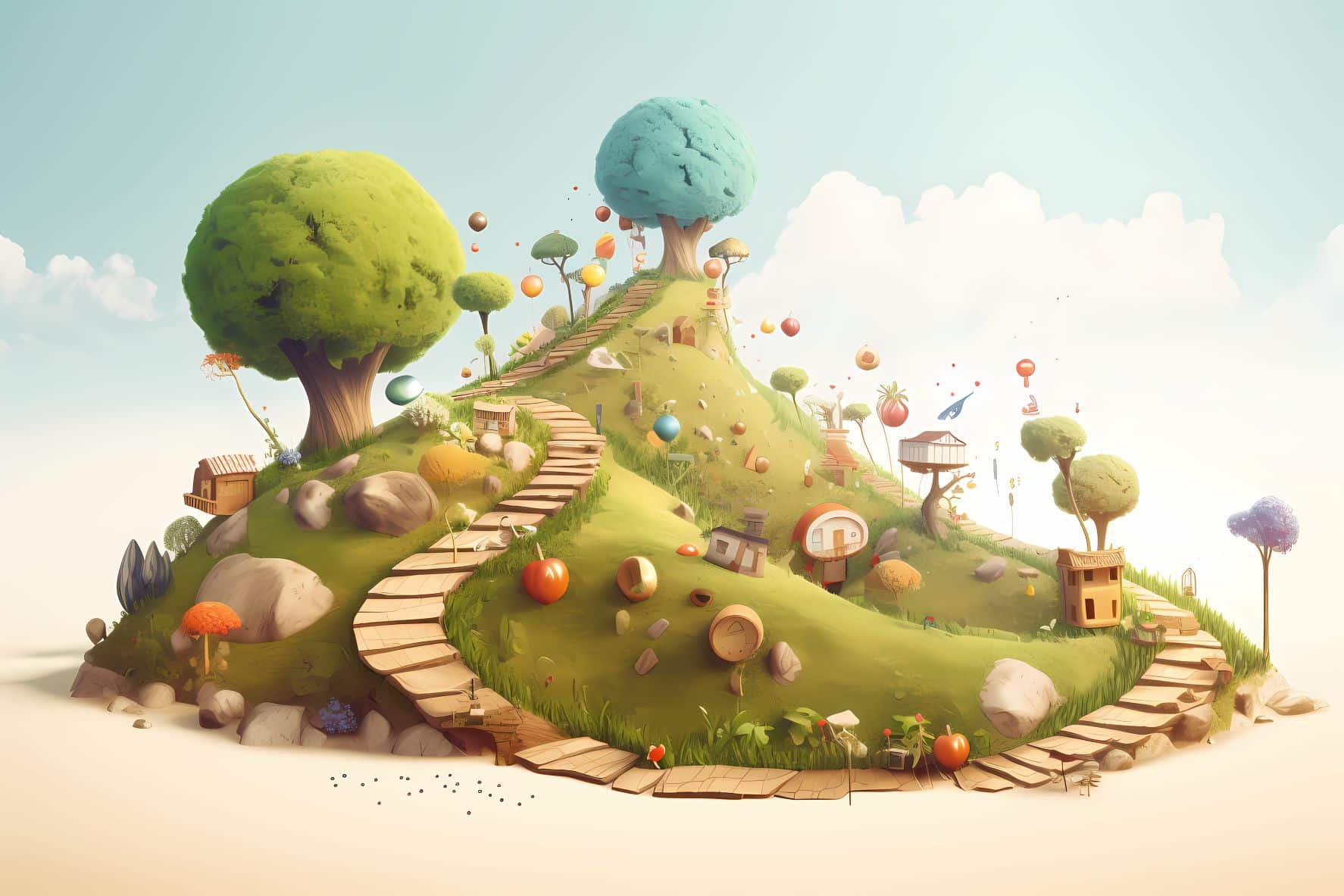
By taking a holistic approach, self-improvement becomes a balanced and comprehensive process. It helps us to understand and address our needs in a multi-faceted way. Here’s how it benefits us:
- Improves Overall Health: Physical health is an essential aspect of holistic self-improvement. Regular exercise, a balanced diet, adequate sleep, and preventive health measures contribute to improved physical health and play a crucial role in maintaining mental and emotional health.
- Promotes Emotional Well-being: By addressing our emotions, we gain deeper insights into our feelings, reactions, and overall sense of self. Mindfulness, meditation, and self-reflection can foster emotional resilience and help us respond more effectively to stress.
- Enhances Cognitive Abilities: Learning new skills, pursuing intellectual interests, and maintaining a growth mindset are critical components of cognitive self-improvement. Adding these qualities sharpens our minds and opens up further professional and personal development opportunities.
- Boosts Professional Success: Holistic self-improvement encompasses self-confidence, communication skills, leadership abilities, and emotional intelligence crucial for career growth and business success.
- Strengthens Social Relationships: This approach recognizes the value of healthy relationships and social interactions. Developing good interpersonal skills and fostering strong relationships can improve mental health and enhance personal and professional lives.
Incorporating It into Your Life
Holistic self-improvement isn’t a one-size-fits-all journey. Here are some ways to incorporate it into your life:
- Set Balanced Goals: When setting your goals, ensure they encompass different areas of your life. New objectives could include physical goals (like running a half marathon), mental goals (such as learning a new language), emotional goals (like practicing mindfulness), social goals (such as building a supportive network), spiritual goals (like practicing daily meditation), and professional goals (such as improving leadership skills).
- Implement a Routine: A daily routine that addresses different areas of your life can be beneficial. Such practice might involve allocating time for exercise, meditation, learning, socializing, and leisure activities.
- Invest in Learning: Never stop learning. The process could be learning a new skill, pursuing a hobby, or undertaking professional development. Learning keeps your brain active and boosts self-confidence.
- Practice Mindfulness: Incorporate mindfulness into your routine to stay in tune with your emotions and thoughts. This strategy can improve mental health, reduce stress, and enhance well-being.
- Maintain a Healthy Lifestyle: Maintaining a balanced diet, exercising regularly, ensuring adequate sleep, and caring for your physical health are fundamental aspects of holistic self-improvement.
- Foster Healthy Relationships: Invest time and effort in building strong and positive relationships. Social interactions and healthy relationships are vital components of emotional well-being.
By following a holistic self-improvement approach, individuals can achieve balance and harmony in different areas of their lives, leading to improved personal satisfaction, career growth, and business success. It’s a journey, not a destination, and every step forward, no matter how small, contributes to a fuller, healthier, and more fulfilled life.
Updated 12/01/2023

Who Are They? Decoding Daily Narratives
How many times in life have you had or overheard a conversation like: “They say it’s going to rain tomorrow,” “They found a new cure for the common cold,” or even “they don’t make them like they used to.”
While these are great conversations, and the statement might hold truth – for example, the prediction of rain comes true or the remedy for the typical cold works – the issue here is not about whether “they” are right or wrong. It’s about understanding who “they” are and how we should react to what ‘they’ say.
Who Are They? Why The Source Matters
Without knowing who ‘they’ are creates a state of uncertainty. It’s akin to listening to a masked speaker, we may trust their words, but we don’t know who’s behind the mask. And that can be problematic, especially when the information ‘they’ are sharing impacts our decisions and actions.
For example, “They say it will rain heavily tomorrow.” If “they” is a professional weather forecasting service, their prediction likely stems from analyzing various meteorological data. The information is science-based and probably has a relatively high degree of accuracy.
But what if “they” is a superstitious neighbor who believes aching joints predict rain? The reliability of the information changes drastically. In one scenario, you might cancel a planned day at the beach. On the other, you might take a wait-and-see approach before changing plans.
The same goes for “They found a new cure for the common cold.” This breakthrough could benefit millions if “they” refers to a reputable research institute. But if “they” is a social media influencer promoting a health supplement, the so-called “cure” might be part of a bigger, more overreaching, or undisclosed marketing campaign.
Lastly, let’s discuss the last statement, “They don’t make them like they used to.” If “they” refers to manufacturers or craftsmen, this statement might represent a genuine product quality or design shift. But if “they” are your beloved nostalgic friends who always think the past was better, it’s an opinion that may not reflect the actual quality or value of contemporary products.
Information Quality Matters

Understanding who “they” are allows us to evaluate the information “they” share and make informed decisions. If we unthinkingly trust what “they” say without questioning the source, we risk being misled or manipulated.
Now, you might wonder, “how do I identify who ‘they’ are?” Well, it starts with asking questions: Who is saying this? What are their credentials? Do they have a vested interest? Is there corroborative evidence from other reputable sources? Developing this kind of inquiry mindset can significantly enhance our ability to discern fact from fiction.
Remember, in our information-driven world, knowing and understanding who the source, collectively known as “they,” is beneficial and essential for critical thinking.
Accurate information helps us separate the wheat from the chaff and extract valuable insights from the mere noise. As we continue to engage with information daily, let’s not forget to ask: who is “they?” By doing so, we equip ourselves with the right tools to navigate the complexities of our modern world.
Let’s use another example. You’re enjoying a meal with your family when your uncle casually mentions, “They say carrots improve your vision.” It’s a statement we’ve all heard before!
But let’s take a moment to ponder; who exactly is ‘they’? Could ‘they’ be a dedicated scientist behind a groundbreaking study, a renowned health magazine sharing insights, or perhaps it’s merely an age-old myth passed down through generations?
The reality is we must delve beneath the surface to uncover the truth. This unidentified entity could sway our perceptions and choices if we fail to discern who ‘they’ are.
The History Behind “They Say”
The phrase “they say” is as old as language itself. Historically, it’s been a way to express a collective thought or belief without specifying who exactly holds it. However, in this era of information overload, discerning who ‘they’ is has become more critical than ever.
Why? Because not all information sources are created equal. Some have thorough research and fact-checked, while others on opinions, misinformation, or even (and unfortunately) deliberate falsehoods.
Getting To The Source
Does this mean we should automatically distrust every information prefixed by ‘they’? Of course not!
Often, “they” refers to experts in a particular field. For example, when ‘they’ recommend washing hands to prevent disease spread, ‘they’ is likely public health professionals. Listening to “they” could save lives and promote better community health in these cases.
The problem arises when we don’t know who ‘they’ are or when ‘they’ are used to spread misinformation or baseless claims. Without a clear source, we’re unable to evaluate the reliability of the information. It’s like navigating a ship without a compass – we might get lucky and hit the mark or end up hopelessly off course.
Who Are They? It Is A Question That Begs For An Answer
So, how can we better understand who ‘they’ is? The answer is simple: question, question, question. When you encounter ‘they,’ ask: Where is this information coming from? Is it based on research or fact? Is there a potential bias or conflict of interest? This habit of critical thinking can help us discern the truth and make informed decisions.
Not knowing who ‘they’ are could lead to confusion and misinformation. But, with curiosity and critical thinking, we can uncover who ‘they’ is and empower ourselves with accurate knowledge. The next time you hear “they say,” don’t just accept it—question it. Ask who ‘they’ are. Because understanding ‘they’ is the key to decoding our daily narratives and making sense of the world around us. Let’s strive to replace the ambiguous ‘they’ with solid facts and reliable sources. After all, knowledge is power!
To wrap up, ‘they’ can be anyone from experts to salesmen, and knowing who ‘they’ is helps us understand the information better. Let’s be curious, question the sources, and strive for a clearer, more informed perspective. It’s not just about knowing the world better but also about better knowing ourselves and how we interpret it. So, who’s ready to decode the daily narrative and discover who ‘they’ really are?
-
 Shop the Dream Chasing T-Shirt – Unisex Heavy Cotton Tee | Comfort & Style15,00 € – 23,00 €
Shop the Dream Chasing T-Shirt – Unisex Heavy Cotton Tee | Comfort & Style15,00 € – 23,00 € -
 Green Urbanism Tee – Sustainable and Eco-Friendly T-Shirt27,00 € – 28,00 €
Green Urbanism Tee – Sustainable and Eco-Friendly T-Shirt27,00 € – 28,00 € -
 Always Stay Positive T-Shirt15,00 € – 23,00 €
Always Stay Positive T-Shirt15,00 € – 23,00 €
-